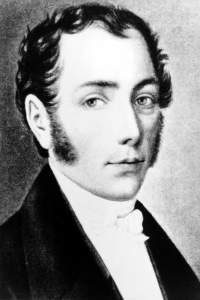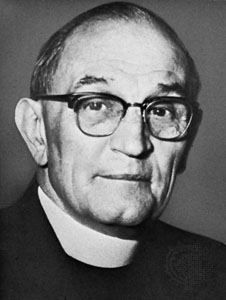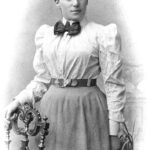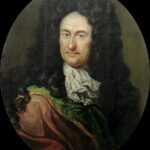March 6, 1787
Birth of Joseph von Fraunhofer in Straubing, Germany. The physicist, Fraunhofer, was the first to observe the dark lines in the spectrum of the sun, which became known as Fraunhofer lines. In his further work he discovered and charted similar spectral lines in the elements. His work led to the development of the technique of spectroscopy. Fraunhofer did his work at the Untzschneider Optical Institute at Benedictbeuern, Germany.
March 6, 1842
Death of Konstanze Weber in Salzburg, Austria. Weber was a soprano who married Wolfgang Amadeus Mozart in 1782 in Vienna. After her husbands death she oversaw the publication of his music. In 1809 she married Georg Nissen, who wrote the first biographyof Wolfgang Amadeus Mozart. Nissen died in 1826 and Konstanze lived as a widow in Salzburg until her death.
March 6, 1847
Birth of Johann Georg Hagen in Bregenz, Austria. The Jesuit priest and astronomer, Hagen, discovered Hagen’s clouds, dark clusters of matter among the stars. This discovery was made in and after 1893. More recent astronomers have become skeptical of the existence of the clouds, speculating that Hagen’s observations may have been technical illusions.
March 6, 1870
Birth of Oscar Straus in Vienna, Austria. The composer, Straus, lived in Austria and Germany except for the period 1940 to 1948 which he spent in the United States. Operettas by Straus include Der tapfere Soldat, (1908), Ein Walzertraum (1907) and Rund um die Liebe (1914).
March 6, 1900
Death of Gottlieb Daimler (1834-1900) in Cannstatt, Germany (near Stuttgart). Daimler was a mechanical engineer who started his career working in the company of the inventor of the four-stroke internal-combustion engine, Nikolaus Otto. He and an associate, Wilhelm Maybach founded their own company in 1882 to build their own engines. In 1885 they invented a carburetor for their engines and in 1889 they built one of the worlds first automobiles (the other was built by Karl Benz in the same year.) They founded the Daimler-Motoren-Gesellschaft in 1890 to build and market their automobile. An early model was named the Mercedes. Later Daimler merged with Benz to found the Daimler-Benz Company, now known widely as the Mercedes-Benz Company.
March 6, 1911 Death of Franziska Streitel (1844 – 1911)
The processes of beatification has been initiated on behalf of Franziska Streitel. She was born on November 24, 1844 in Mellrichstadt in Bavaria, Germany. She became a Franciscan nun in Augsburg. In 1883 she founded a new order, the Sisters of the suffering Mother or the Adolorata Sisters. She was removed as the Mother Superior in 1896 on the basis of accusations which were since proven to be false. She then lived in cloisters in Rome until her death in 1911. The order is active today in Austria, Italy and the U.S.A. The sisters dedicate themselves to care of the sick and the education of young women.
March 6, 1921
Birth of Julius Rudel in Vienna, Austria. Rudel undertook his study of music in Vienna and then immigrated to the United States. He conducted the New York City Opera from 1944-1979. In 1979 he became the music director of the Buffalo Philharmonic Orchestra.
March 6, 1930
Death of Alfred von Tirpitz in Ebenhausen, Germany. Von Tirpitz became an admiral and worked with Kaiser Wilhelm II in attempting to build Germany’s navy to a level competitive with that of Britain. The first German Fleet Act was introduced in 1898 and set the goal of building a defensive navy. A second Fleet Act designed to allow the German navy to rival Britain was passed in 1900. Britain did not react until about 1905 when it began to develop its own fleet. (Ironically it was an Austrian, Louis Alexander Battenberg who took on the task of building the British navy with Churchill. Battenberg changed his name to Mountbatten in 1917.)
March 6, 1935
Death of Max von Hussarek in Vienna, Austria. He was appointed prime minister of Austria on July 25, 1918, attempted some reforms and resigned on October, 27, 1918.
March 6, 1983
The Federal Republic of Germany (West Germany) holds parliamentary elections. The CDU/CSU gets 48.8% of the vote, the SPD 38.2%, the FDP 7% and the Green Party 5,6%. This is the first time the Greens have had seats in parliament. It is the first time in the history of the Federal Republic of Germany that a party other than the CDU/CSU, SPD and FDP has been represented in the Bundestag. The CDU/CSU coalition with the FDP continues. Helmut Kohl (CDU) continues as chancellor and Hans-Dietrich Genscher (FDP) as vicechancellor and foreign minister.
March 6, 1984
Death of Martin Niemöller in Wiesbaden, Germany. Niemöller served as a commander of a submarine in World War I. He undertook studies in theology after the war and became a pastor in Berlin. He was a leader in the resistance against Hitler. He was arrested in 1937 and sent to the camp in Dachau. After the war he returned to his work in the church. His experiences in the war and his conscience led him to very active pacifism during the “Cold War”. He was given the Lenin Peace Prize in 1967 and the German “Grand Cross of Merit” in 1971.
Back to Today in German History Calendar










